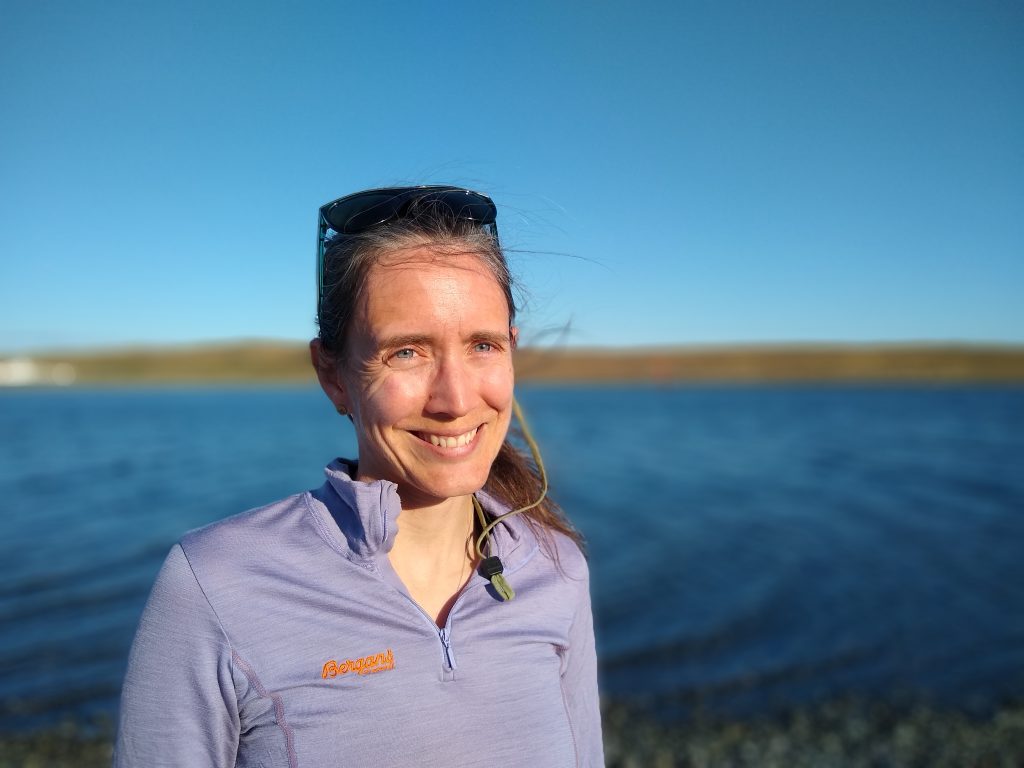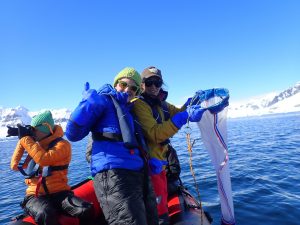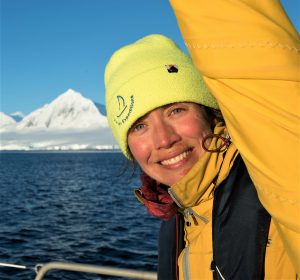Spotlight: Laura Smith & the Polar Citizen Science Collective
 Co-owner Quixote Expeditions & Polar Citizen Science Collective Chair of the Board of Trustees
Co-owner Quixote Expeditions & Polar Citizen Science Collective Chair of the Board of Trustees
We are lucky to have interesting friends in the world of Antarctic travel, and Laura Smith is definitely one of those people. Laura co-owns Quixote Expeditions with her husband Federico, where they run a sailboat and a small ship to Antarctica via fly cruises. But more than that, Laura is involved in many aspects of the Antarctica tourism world. She is the current chair of the board of trustees for the UK charity Polar Citizen Science Collective. This fascinating project brings together scientists looking for on-the-ground data, with polar guides and travelers who can provide on-the-ground information for these projects.
We sat down with Laura so she could explain more about this growing organization and the importance of supporting citizen science projects in Antarctica.
- What is citizen science?
Citizen science is real science conducted by the general public without the need of a degree in science. Citizen science falls across a broad spectrum. Sometimes it is very local, sometimes the projects are global. Sometimes there is minimal training and sometimes some training is required to be able to collect the data. But at the heart of it all – it’s you and me collecting data that a scientist will then use in their research.
One important thing is that citizen science is not just an activity to pretend to do science, but it is the collection of REAL data the scientists use.
- How does this work on small expedition ships? Can everyone participate?
Small expedition ships to Antarctica or the Artcic are an amazing, underutilized resource for science. Often a government sponsored science cruise will do one pass through a region only once a year, so the data that gets collected is a very small snapshot in time. If we use passenger expedition ships as platforms for science – we have a fleet of vessels that is in the region for up to five months and is able to collect data in both time and space throughout a season.
Many operators have seen the benefit of doing citizen science – not only as a public good, but also as an amazing way to enhance the experience of guests. All projects are different and require different amounts of time, but they all fit nicely into the itinerary of a small expeditions ship. Some of the science projects take place from the deck of a ship while the vessel is in transit – this can include projects with whale identification and taking photos of clouds to ground truth NASA satellites.

Other projects might take place in the zodiac when water collection is needed. One project that is underway right now tows a net to collect phytoplankton that the guests then help filter out of the water.
And other projects take place once on land. These include looking at penguin colonies or snapping photos of snow algae.
Each operator will choose a subset to do onboard, as its better to do a few really well than a ton of them not so well. Not all operators do citizen science, so if it’s something one is interested in – make sure to ask prior to booking, as there are plenty that do. Often you sign up once onboard to participate, or go in a special science zodiac.
Along with collecting the data, the operators will also give presentations to explain the projects – both how the collection methods work, but also how the data will be used.
The Polar Citizen Science Collective, (often called the Polar Collective) helps operators to make these projects successful. The Polar Collective is a UK Charity that specifically works with scientists and operators to make citizen science happen. We provide the educational material, we work the scientists to make sure that the data collection process will “work” on an expedition ship, we vet the projects, so that operators know the data is of value and used by real scientists. We also facilitate the training of the guides who will lead the guests on board in these projects.
- What was your idea in founding the Polar Citizen Science Collective?
I was not a founder of the polar collective, but I am the current chair of the board of trustees. The Polar Collective was founded by five guides in 2017. They were all trying to incorporate more science into the onboard programming and each struggled to find the right projects. Once they had found a few, they decided to come together and share their knowledge with others. The Collective has grown from there. It is now a UK Registered Charity and in addition to finding projects that work, we are actively working with scientists who really need data in the polar regions to get their projects onboard in a citizen science-friendly way.
While I didn’t found the Collective, I was doing similar things on our vessels and with similar struggles. When I was asked to join the board, I jumped at the chance, as the Collective 100% aligns with what I think is important in the Polar regions.
- Can you tell us about a few projects you are working on?
Onboard my own vessel I’ve participated in FjordPhyto, where we tow a net to collect phytoplankton and then filter it out onboard. We also have microscopes so we can look at some of the phytoplankton we collect. There are different types of phytoplankton and they like different conditions – some like salter water, other like more fresh, for example. By looking at the composition of phytoplankton over a season in a fjord (where a glacier is melting into it, providing an influx of fresh water), the scientists can start to make guesses at what will happen in the future as there is more and more fresh water from melting glaciers and what effects the changing phytoplankton populations might have for other animals further up the Antarctic food chain.
The collective also has some exciting new projects in the pipeline, including one looking at snow algae!

Ok, now I want to change it up a little and talk about Antarctica and you in general.
- Your favorite thing about Antarctica?
I love that Antarctica seems to be eternal yet changing all the time. When you return to a place there is the comfort in returning to somewhere known, but then there is always something different, perhaps there is more snow this year, or perhaps an iceberg made it inaccessible. Icebergs are like clouds – always changing – moving and rolling and giving a different feel to each place and view.
- Your favorite landing / site?
I love landing at Whalers Bay in Deception Island. After staring at all the wildlife and the forces of ice, it always amazes me to go to this spot where humans lived and must have endured so much. Of course, it’s also a keen reminder of the past where whale oil was king. It all seems so barbarous now, but I always wonder if in 100 years, future generations will look back and will think the same about our petroleum use. We forget how ubiquitous whale oil was in society – not just lanterns, but all sorts of products, just like petroleum products are for us today.
- Favorite Antarctic animal?
Oh my favorite animal – that one is so hard, they are all great. I will admit my background is geology, so sometimes I find the birds that fly hard to identify – it has taken me a lot of time and patience to get it right. So, I like the animals that don’t move too fast. I always find the Weddell seals super elegant. That said, I am totally ready to make a soap opera based on Gentoo interactions – rock stealing, love, chicks – so much action.
- Any short anecdote?
My first trip to Antarctica was actually on a sailboat that my husband built. It was the two of us and two friends. (It was also our honeymoon). It was an incredible first way to go to Antarctica. We had a lot to learn, but we put so much effort into learning what we needed, about all the places, guidelines etc. I also did some citizen science on my very first trip!



Leave a Reply